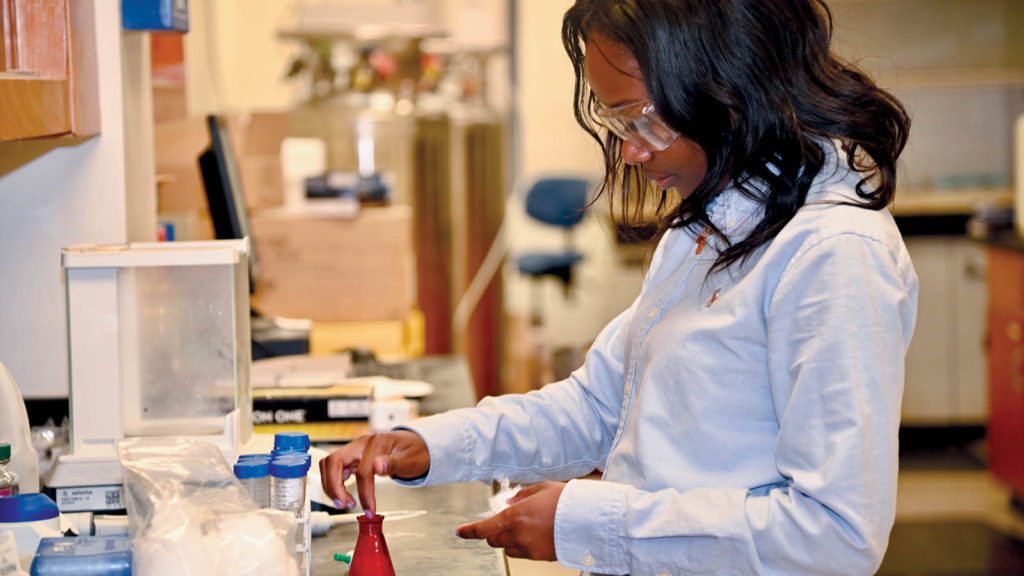
The Textile Technology Center (TTC) at Gaston College in Belmont, N.C., formally known as the North Carolina Center for Applied Textile Technology, was founded in 1943 to offer certificates, diplomas and trade degrees for the textile disciplines. Its degree programs stopped in the early 2000s after several textile manufacturers left the U.S. In late 2020, the college’s president and faculty decided to relaunch an associate textile technology degree to support the resurgent industry.
Located in the heart of U.S. textile manufacturing, Gaston College offers a variety of textiles technology training programs. These include a textiles technology associate in applied science (AAS) degree as well as customized training courses on specific topics and machines. Four concentrations are offered in the two-year degree program: design, general, textile management and textile technician.
“From general, technician, design/fashion or management, each student will be able to find the perfect program,” says Jasmine Cox, director of textile technology programs and business innovation at Gaston College. All degree tracks share some core textile courses while offering different electives.
All students get hands-on training with the same machines used in textile manufacturing plants. Laboratory curriculum content relies heavily on the Manufacturing and Textile Innovation Network (MTIN), a partnership between the TTC at Gaston College and the Manufacturing Solutions Center (MSC) at Catawba Valley Community College (CVCC) in Hickory, N.C.
“Combined, the two centers offer a total of 12 unique labs and process areas where students can shadow experienced technicians and practice hands-on skills” after completing one year of courses, Cox says. Grant funding and donations from local industry partners have enabled the schools to obtain unique lab-scale equipment for use solely in student laboratories to support classroom studies.
Not just traditional high school graduates
Some students begin their studies at Gaston College having already earned several college credits through high school Career and College Promise (CCP) courses as well as career and technical education (CTE). Along with full-time students who attend straight out of high school, Gaston College welcomes adult learners and students who work full time, often in the textiles industry, who take courses at a pace conducive to their success.
They may include people “currently employed as machine operators in need of advancement,” says Cox. “Obtaining a degree in textile technology will allow qualified students to transition into supervisory roles.”
Those not seeking a degree can take customized training courses offered on demand monthly and annually. These include Textile 101, Hosiery 101 and 102, M1 Stoll training, Santoni seamless knitting training, USTER® Technologies training and vendor-specific yarn training.
More training opportunities available soon
In addition to these single-subject training courses, Gaston College launched the Textile Academy in early 2022.
“This academy is modeled after the Furniture Academy at CVCC,” Cox explains. “The Textile Academy allows attendees to receive stackable credentials through a six-to-eight-week intensive course that introduces students to the basic concepts of textile technology and careers within the textile industry. The course includes training on core concepts, such as textile fundamentals, textile manufacturing concepts, math and measurement, teamwork and communication, safety, Lean manufacturing principles and problem solving.
“Upon completion of the Textile Technology Fundamentals course, students will be equipped to seek employment in various sectors of the textile and apparel supply chain,” she continues. “The Textile Academy will also serve as an onboarding program for companies in the Gaston College service area and customers of the MTIN. Companies can enroll new hires in the academy.” Course content can be customized for each organization’s needs.
Which training to choose?
Students select their training option based on their current status in the industry and their future goals.
“Students who would like to matriculate into a four-year program and beyond should enroll in the degree program,” says Cox. “Graduates will have an easy transition into the workforce as management trainees, quality specialists, sourcing assistants, machine technicians, brand specialists and more.” Machine operators who seek management or supervisory positions should also take the degree path if it is required to advance at a particular organization.
“For students who may be adult learners, undecided or full-time employed, we encourage a shorter training such as the Textile Academy,” Cox adds. “The Textile Academy will expose them to various parts of the textile supply chain. Upon completion, students will receive a certificate from Gaston College. Students who successfully finish the textile academy could potentially receive curriculum credit in the degree program.”
A new Gaston College policy lets eligible students in the academy receive curriculum credit for related work experience. This work experience credit could also count toward the AAS degree.
Filling textile industry training gaps
Cox says the programs at both community colleges are filling a training gap that has existed in the textile industry since the early 2000s. Gaston College’s AAS textile technology degree and CVCC’s applied science degree provide options for people who wish to start work right away, along with properly preparing graduates transferring into four-year textile and apparel degree programs.
“We are working closely with university programs such as the North Carolina State University’s Wilson College of Textiles to ensure that our curriculum content is relevant for our modern industry,” she says. “Because we are a part of the North Carolina Community College system, the AAS program will allow students to receive a unique applied science experience with close industry guidance.”
Jean Feingold is a freelance writer based in Gainesville, Fla.
SIDEBAR: Finding talent
Whether a supplier or an installer, finding the right members for your team is a top challenge.
Partnering with a local college or high school can offer a great solution to developing talent, whether it be through formal education programs, apprenticeships or in-house training.
 TEXTILES.ORG
TEXTILES.ORG


